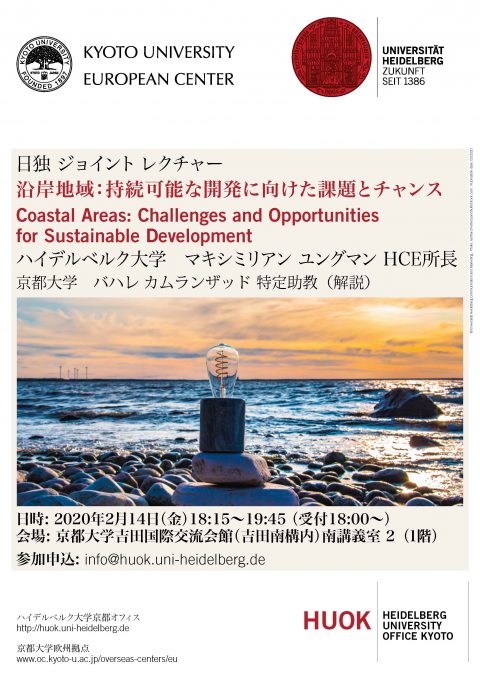 |
Lecturer: Dr. Maximilian Jungmann Executive Director of the Heidelberg Center for the Environment, Heidelberg University
Commentator: Dr. Bahareh Kamranzad Graduate School of Advanced Integrated Studies in Human Survivability (GSAIS), Habuki Center, Kyoto University
Date: 14 February 2020, 18:15–19:45 Venue: Yoshida International Exchange Hall, Yoshida Campus, Kyoto University Language: English |
Abstract
Climate change, rising populations, growing inequalities, international migration flows, new health and security risks –the 21stcentury continues to confront populations across the world with enormous challenges. This is particularly the case for coastal regions, which are at the forefront of present and future impacts of climate change. At the same time, however, new technologies and social, political, and economic innovations have produced a great number of opportunities for sustainable development in coastal regions that can help overcome many risks humanity is facing.
In an attempt to connect global trends in the field of sustainable development with local circumstances in coastal regions, the presentation will start with a very brief introduction to sustainable development and the international framework on sustainability, with an emphasis on the 2030 Agenda for Sustainable Development and the Sustainable Development Goals. Focusing on SDG 13 (climate action), the presentation will continue with an analysis of the challenges and opportunities of coastal regions for sustainable development and the interconnections between different SDGs. Last but not least, the speaker will discuss a number of drivers and barriers of mitigation and adaptation to climate change in coastal regions and invite participants to a discussion on the theme: Coastal Areas: Think Global, Act Local?
Schedule
| 18:15 | Welcoming Address/ Presentation of Kyoto University’s AI DA program |
|
18:20
|
Lecture Dr. Maximilian Jungmann (Executive Director of the Heidelberg Center for the Environment, Heidelberg University) “Coastal Areas: Challenges and Opportunities for Sustainable Development”
|
|
19:00
|
Commentary Dr. Bahareh Kamranzad (Graduate School of Advanced Integrated Studies in Human Survivability (GSAIS), Habuki Center, Kyoto University)
|
| 19:20 | Discussion |
| 19:45 | Reception |
| 20:30 | Closing |
Moderation: Sabine Schenk (Heidelberg University Office, Kyoto) and Tarō Sonobe (Kyoto University Research Administration Office)
Registration & Contact
Deadline: 12 February, 2020
Please send us an e-mail containing your name and affiliated organization to the following address:
Heidelberg University Office Kyoto
E-Mail: info@huok.uni-heidelberg.de
Telephone: 075-753-5413
Profile
Dr. Maximilian Jungmann
Executive Director of the Heidelberg Center for the Environment, Heidelberg University
Maximilian Jungmann holds a PhD in Political Science from the University of Heidelberg in Germany. He is the Executive Manager of the Heidelberg Center for the Environment and lecturer at the Chair of International Relations and Foreign Policy at the University of Heidelberg, as well as the Karlsruhe Institute of Technology. He teaches classes on the interdependencies between media, society, and politics, on topics related to sustainable development and climate change, on scenario building in International Relations, on effective working techniques, and the United Nations. In 2018, he founded Momentum Novum, a social enterprise that offers information, educational and advisory services on sustainable development. He currently acts as the CEO of Momentum Novum where he leads a team of over 20 international individuals that seek to foster sustainable development. He volunteers his time as a Climate Reality Leader and at the National Model United Nations • New York, where he serves as Under-Secretary-General for the Conference Management Department. His main research areas are centered around climate change and health, sustainable development, futurology, media effects, and International Relations theories.
Dr. Bahareh Kamranzad
Graduate School of Advanced Integrated Studies in Human Survivability (GSAIS), Habuki Center, Kyoto University
Dr. Kamranzad research focus is the assessment of climate change impacts on wave energy resources and extreme events to ensure a reliable supply of energy and efficient use of it, as well as reducing the uncertainties in coastal hazards and investigating the combined impact of climate change and installment of WECs on sea state and coastal morphology to reduce the uncertainties in planning for a future sustainable development.
For more information about Dr. Kamranzad, please see here.
* The lecture series “Nichi-Doku Joint Lecture” is organized in close cooperation of the Kyoto University European Center, Heidelberg Office, and the Heidelberg University Office, Kyoto, the liaison offices of both universities in Japan and Germany. It aims at promoting and strengthening research exchange between Heidelberg University and Kyoto University.


